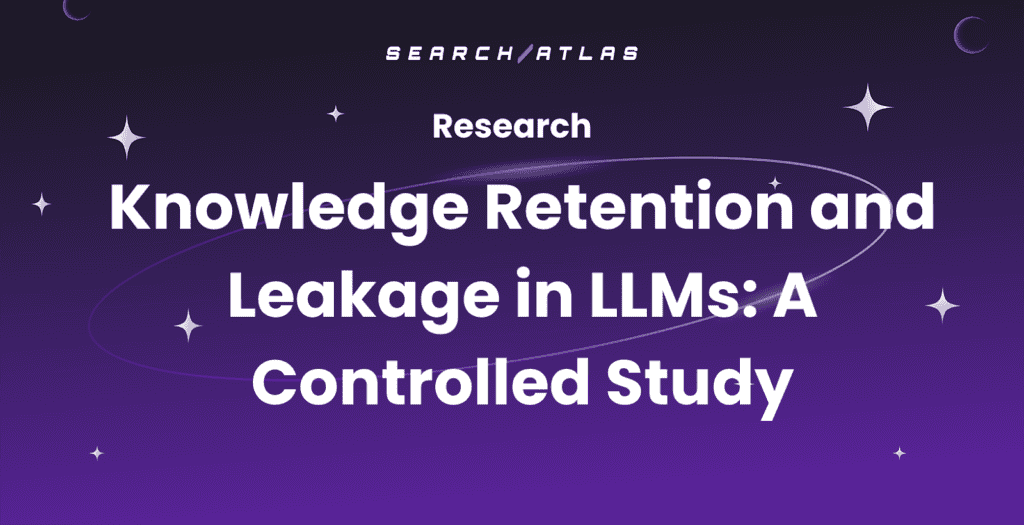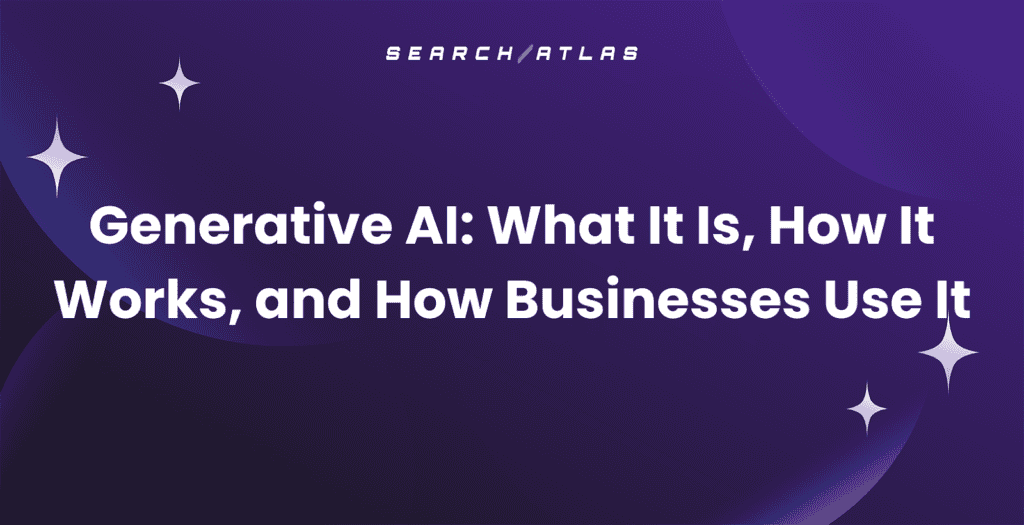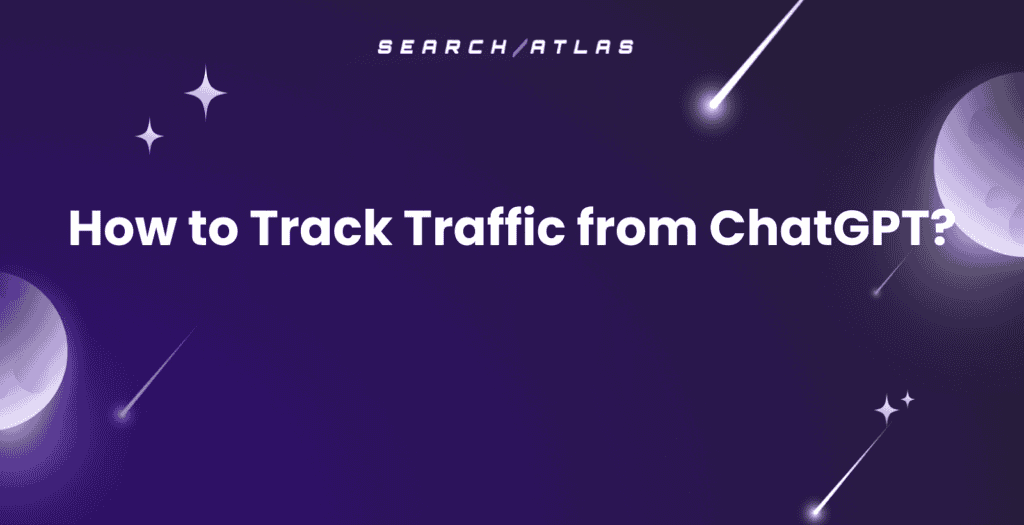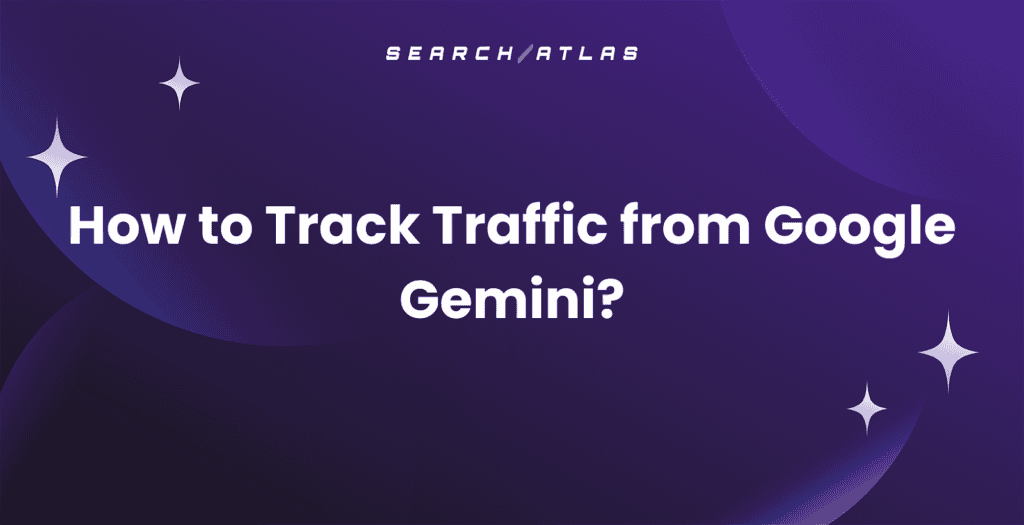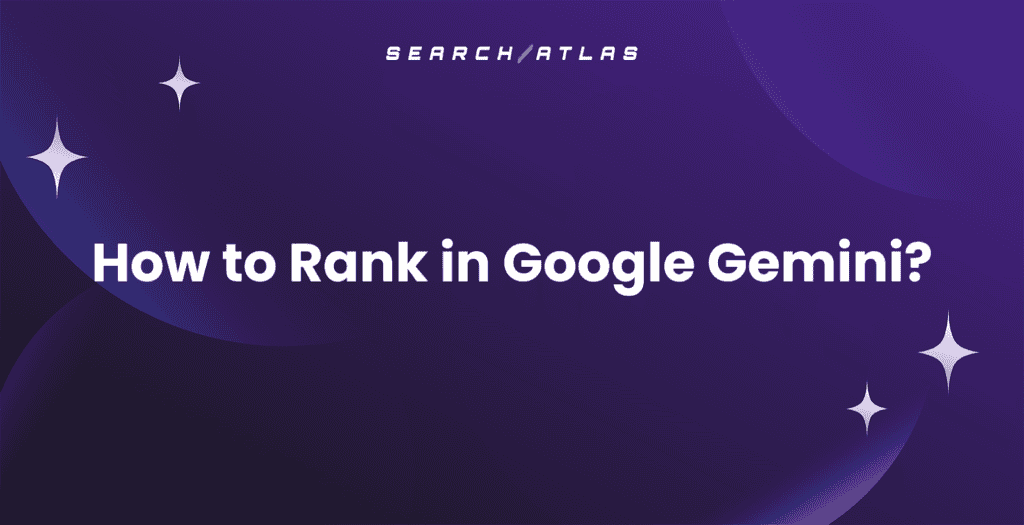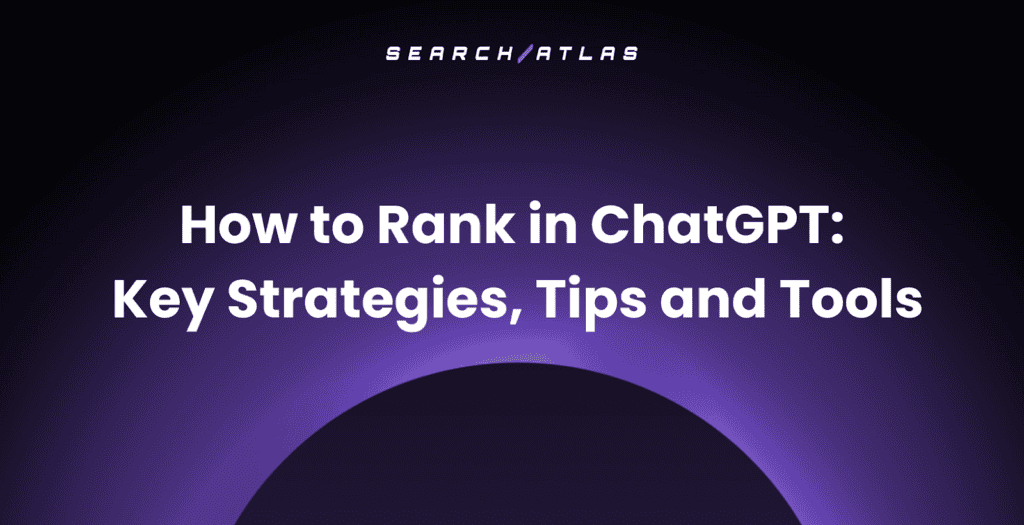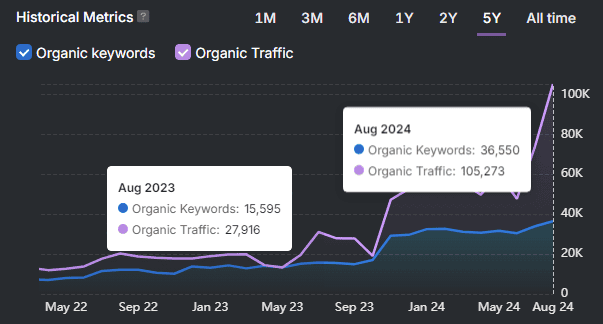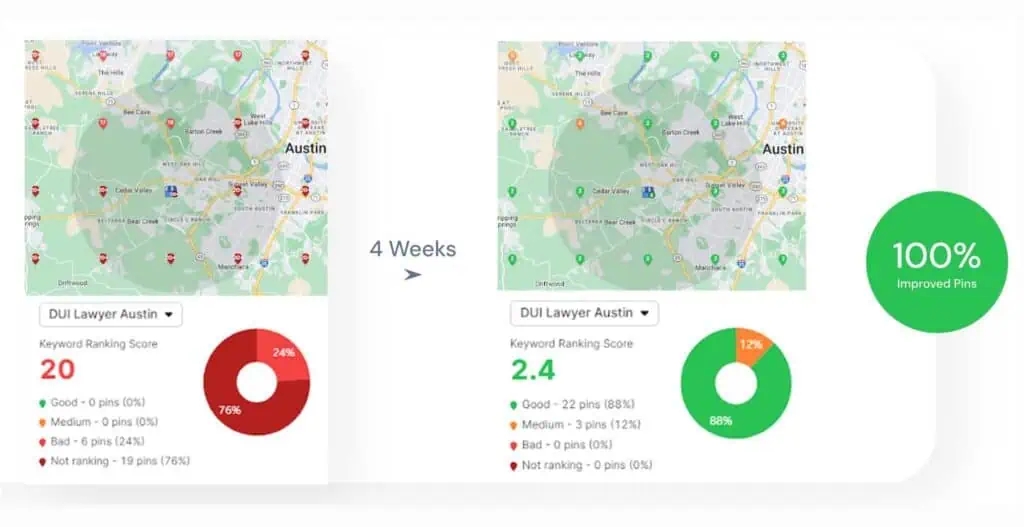The best MarketMuse alternatives are content optimization tools that replace or outperform MarketMuse in core content SEO tasks, such as content planning, SERP analysis, topic research, content briefs, and optimization scoring. MarketMuse alternatives offer different approaches to content intelligence, from AI-powered writing assistance to comprehensive content workflow management.
MarketMuse is an SEO tool that has established itself in the content intelligence field with features like topic modeling, content scoring, and competitive content analysis. However, MarketMuse reviews testify that the tool falls short for many users due to its high pricing, steep learning curve, and limited integration options.
MarketMuse pricing starts at $99/month for the Optimize plan. Many users seek alternatives to MarketMuse that provide similar content optimization capabilities at a more affordable price or with better user experiences.
The best MarketMuse alternatives in 2025 are Search Atlas, Rankability, and Content Harmony. These tools excel in different aspects of content optimization while offering better value and more intuitive workflows than the complex interface in MarketMuse.
What are the Best MarketMuse Alternatives?
| # | MarketMuse Alternative | Best For | Price |
| 1 | Search Atlas | Complete SEO & content automation | $99/month |
| 2 | Rankability | SERP data extraction | $59/month |
| 3 | Content Harmony | Structured content brief creation | $10 trial |
| 4 | Frase | Research-driven AI writing | $45/month |
| 5 | Surfer SEO | SERP-driven content briefs | $79/month |
| 6 | Conductor | Collaborative SEO workflows | Custom pricing |
| 7 | Scalenut | AI content planning | $29/month |
| 8 | Dashword | Real-time content scoring | $99/month |
| 9 | WriterZen | Topic discovery & keyword clustering | $23/month |
| 10 | Clearscope | Easy-to-use content scoring | $189 per month |
| 11 | BrightEdge | Enterprise insights | Custom pricing |
| 12 | Outranking | AI content structuring | $79/month |
| 13 | INK for All | Distraction-free SEO writing | $49/month |
| 14 | Plerdy | Website user behavior insights | $32/month |
| 15 | NeuronWriter | Budget-friendly content optimization | $23/month |
| 16 | SEOwind | AI-powered SEO content briefs | $49/month |
| 17 | AirOps | Scaling AI content operations | $99/month |
| 18 | ArticleInsights | AI-driven content analysis | $29/month |
| 19 | Rytr | Short-form AI writing | $9/month |
| 20 | WriterAccess | Finding freelance SEO writers | $49/month |
| 21 | Semrush SEO Writing Assistant | Platform integration | $60/month for the Content Plan |
| 22 | Ahrefs | Content gap analysis | $129/month |
| 23 | Moz Pro | Competitor content strategy | $99/month |
| 24 | Raven Tools | Integrating SEO content reporting | $49/month |
The 24 best MarketMuse alternatives for every budget and use case are detailed below.
1. Search Atlas: Best MarketMuse Alternative
Search Atlas is an all-in-one SEO platform that combines advanced content planning, AI-powered optimization, technical audits, and real-time SERP insights to replace the need for MarketMuse and other single-purpose tools.
The Search Atlas SEO platform includes content tools such as Content Genius, SCHOLAR, Content Planner, and SEO Topical Map Generator to automate content strategy, creation, optimization, and analysis in one workflow.
Search Atlas Content Genius generates original content in minutes and optimizes every passage for keyword targeting, entity coverage, and SERP competitiveness. Search Atlas SCHOLAR reviews each draft for clarity, accuracy, and information gain using semantic scoring models that expose hidden gaps. Search Atlas Content Planner clusters keywords by intent and streamlines campaign scheduling, which helps users build complete topic coverage at scale. Search Atlas SEO Topical Map Generator creates detailed semantic maps, which ensure that every topic and subtopic supports stronger topical authority.
Search Atlas is the best MarketMuse alternative for teams that want to automate content creation, optimize pages with live SERP data, manage technical SEO, and track rankings from one dashboard. MarketMuse focuses on planning and on-page analysis, while Search Atlas delivers execution, automation, and reporting for every SEO workflow.
Search Atlas is a paid alternative to MarketMuse that starts at $99/month, includes all major features in every plan, and saves most users at least $100/month compared to a MarketMuse subscription plus separate audit and tracking tools.
The pros highlighted in the Search Atlas SEO tool review include unified content creation, optimization, technical auditing, link building, and real-time rank tracking within a single platform, which supports complete SEO management and reduces the need for multiple tools. The con of Search Atlas is the initial learning curve for agencies that are managing several domains.
2. Rankability: Best MarketMuse Alternative for SERP Data Extraction
Rankability is an AI SEO platform that extracts live SERP data to optimize content, generate briefs, and monitor visibility in Google, ChatGPT, and other search engines and LLMs (large language models).
Rankability Content Optimizer scores topic coverage, creates real-time outlines, and rewrites content for clarity and SEO alignment. Rankability AI Writer produces full articles, meta tags, and channel-specific optimization for every draft. Rankability Keyword Finder detects high-impact keywords, questions, and trending topics in classic and AI-driven search. Rankability provides AI-powered outlines, SERP analysis, and instant recommendations.
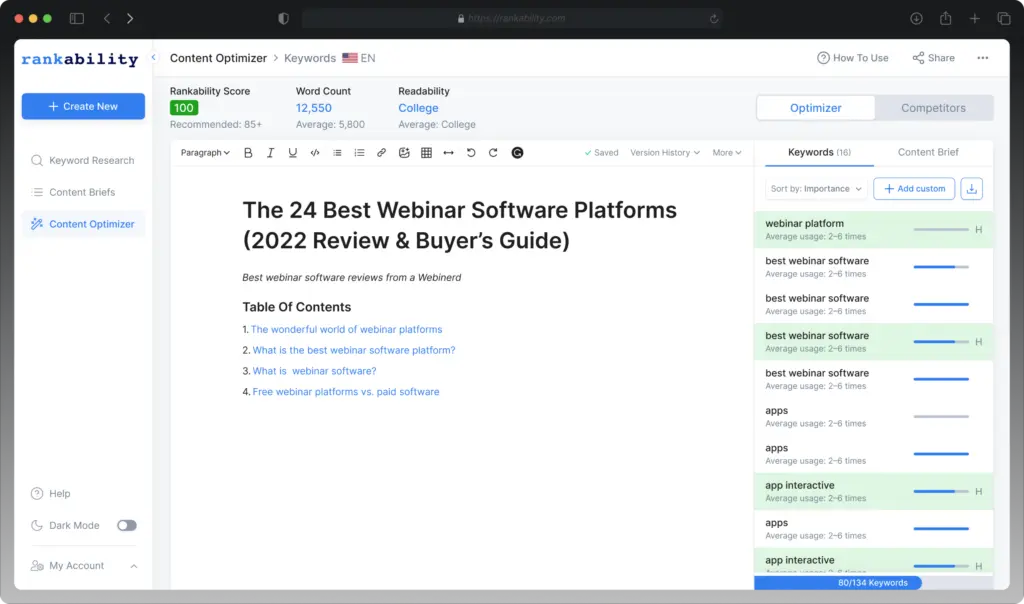
Rankability is the best MarketMuse alternative for detailed SERP research and competitive content analysis. Rankability has the upper hand in SERP data extraction capabilities compared to many competitors, including NeuronWriter. While MarketMuse offers broad content intelligence, Rankability excels in granular SERP analysis that reveals exactly why competitors rank and what content elements drive rankings.
Rankability pricing starts at $124 per month, which is $25 higher than MarketMuse entry plans, but covers direct SERP data extraction and multi-platform research.
Rankability supports SERP-based content optimization, cross-platform keyword research, and topic-driven AI writing. Usage limits apply to article and optimizer credits. Technical SEO tools are not included.
The pros mentioned in the Rankability review include real-time SERP data extraction, AI-powered content briefs, and cross-platform keyword discovery for both Google and AI-driven search engines, which support rapid and intent-focused content optimization.
The cons of Rankability are usage limits on content optimization credits, the lack of technical SEO or audit modules, and a higher entry price.
3. Content Harmony: Best MarketMuse Alternative for Structured Content Brief Creation
Content Harmony is a content workflow platform that automates structured content brief creation, keyword research, and content grading to accelerate editorial production for agencies and in-house teams.
Content Harmony standardizes briefs using search intent analysis, topic modeling, competitor outline research, and integrated keyword reports, which ensures writers address all essential questions and topics for each piece. The workflow combines AI-driven keyword clustering, SERP analysis, and topic coverage scoring, which enables faster research and consistent content quality.
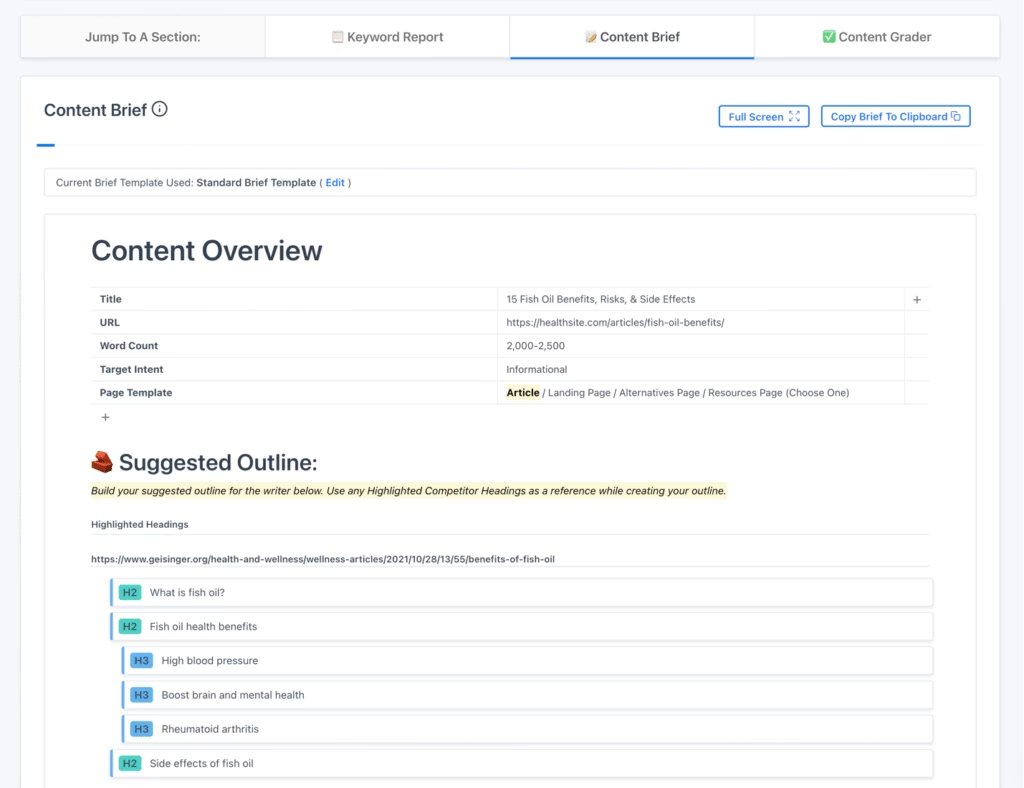
Content Harmony is the best MarketMuse alternative for building detailed, actionable content briefs and optimizing content before publishing. MarketMuse and Content Harmony both support content research and topic modeling, but Content Harmony stands out with highly shareable briefs, integrated content graders, and workflow automation designed for agencies, publishers, and SEO teams.
Content Harmony offers a $10 trial for the first 10 workflows, then charges per workflow or via volume plans, which gives flexibility for different content production volumes. The standard plan costs $99 per month for 12 content workflows, with rollover credits, unlimited users, and unlimited projects. Annual plans average ~$89 per month. Per-workflow pricing starts at $8.
Content Harmony supports standardized briefing, research automation, and topic coverage analysis. Onboarding and migrations are free. International keyword research is available for 9 countries.
The pros outlined in the Content Harmony review include standardized brief formats, AI-powered keyword and SERP analysis, and seamless workflow integration for agencies and teams, which accelerate content production and improve quality control. The cons of Content Harmony are per-workflow pricing, a limited set of content optimization features compared to all-in-one SEO platforms, and the absence of deep technical SEO tools.
4. Frase: Best MarketMuse Alternative for Research-Driven AI Writing
Frase is an AI-powered content platform that streamlines research, outlines, and long-form writing to create SEO-optimized articles for Google, ChatGPT, and new search platforms.
Frase combines instant SERP research, AI-driven content briefs, and a collaborative editor, which allows users to analyze competitor pages, surface key topics, and write optimized drafts. Frase supports custom brand voice, reference document management, multi-user collaboration, and direct integrations with Google Docs and WordPress.
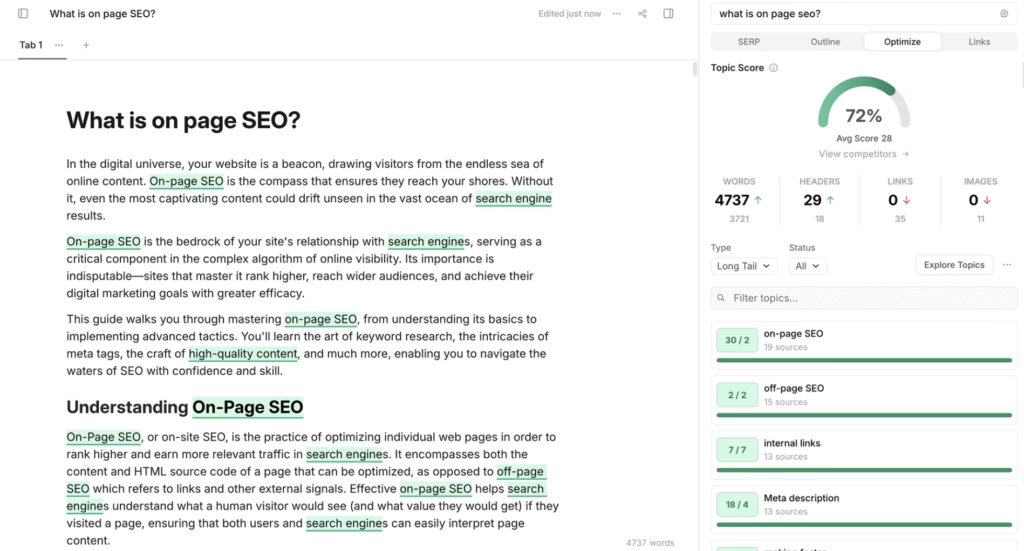
When comparing Frase vs. Marketmuse, Frase is the alternative for teams that need rapid, research-driven AI writing and flexible document generation. While MarketMuse focuses on topic modeling and scoring, Frase delivers instant research, AI content generation, and seamless optimization for multiple channels.
Frase supports unlimited AI word count and pay-as-you-go “Rank-Ready AI Documents,” which start at $2 per draft, without requiring a subscription. Paid Frase plans begin at $45/month for individuals (15 content projects), with professional plans at $115/month for teams (75 content projects). Compared to the MarketMuse cost from $99/month Optimize plan, Frase offers a 50% lower cost and a more flexible entry point.
Frase supports content research, AI drafting, outline creation, content briefs, and collaborative workflows. Unlimited projects, template-based SOPs, and Google Search Console analytics are included. The free trial allows full platform access with no credit card required.
The pros noted in the Frase review include fast research, AI-driven brief generation, unlimited AI writing, and real-time optimization. The cons of Frase are limits on included content projects in base plans, separate pricing for instant Rank-Ready AI Documents, and fewer advanced technical SEO tools compared to some all-in-one platforms.
5. Surfer SEO: Best MarketMuse Alternative for SERP-Driven Content Briefs
Surfer SEO is an on-page optimization platform that creates SERP-driven content briefs, real-time scoring, and AI-powered writing workflows to help teams rank in Google, ChatGPT, and emerging AI search platforms.
Surfer SEO combines SERP analysis, content editor, auto internal linking, and on-demand AI article generation, which enables users to build detailed outlines, optimize structure, and improve topical coverage using NLP-based entity suggestions. The Surfer SEO platform supports multi-user collaboration, Google Docs and WordPress integration, and content planning features like topical maps, performance audits, and rank monitoring.
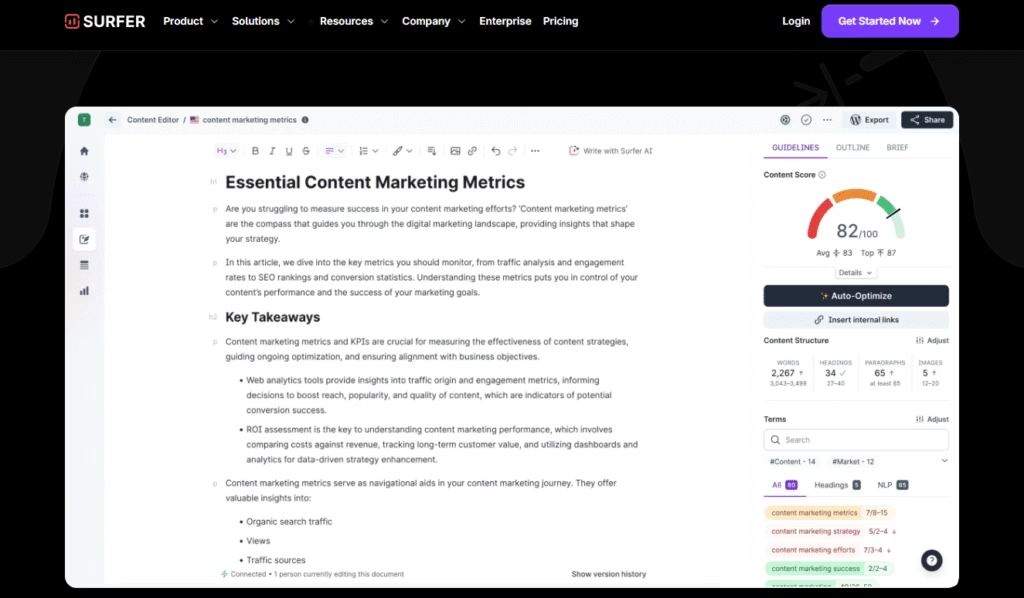
Surfer SEO is the best MarketMuse alternative for users who need real-time SERP-driven content briefs, on-page recommendations, and streamlined optimization. Surfer SEO vs MarketMuse comparisons highlight that Surfer focuses on direct competitor analysis, live content scoring, and actionable entity and internal linking suggestions, while MarketMuse prioritizes topic modeling and planning.
The Surfer AI Content Editor and Auto-Optimize deliver immediate feedback on headings, keywords, and content depth, which allows teams to adjust and publish faster. Surfer supports over 15 languages and provides tools for content auditing, plagiarism checking, and AI detection.
Surfer SEO pricing starts at $89 per month (annual) or $119 per month (monthly) for the Essential plan, which includes 30 optimized articles, collaboration for 1 user, and basic AI content generation. The Scale plan starts at $219 per month, supporting more users and higher output. Compared to $99/month Optimize plan in MarketMuse, Surfer SEO offers a broader feature set for multi-language teams and higher usage tiers, though the entry price is similar.
The pros mentioned in the Surfer SEO review are real-time content suggestions, a user-friendly interface, SERP Analyzer insights, and workflow features that streamline on-page optimization. The cons of Surfer SEO are high pricing, usage caps, limited keyword research, a cluttered interface for SERP analysis, and a risk of over-optimization.
6. Conductor: Best MarketMuse Alternative for Collaborative SEO Workflows
Conductor is an enterprise-grade SEO platform that unifies search data, AI-driven content creation, and real-time website monitoring to support collaborative workflows for large digital teams.
Conductor integrates purpose-built AI for content generation, search visibility analytics, competitive research, and automated technical health checks. Teams use Conductor to create authoritative content, monitor brand presence in Google and AI search, and track site performance from a central dashboard.
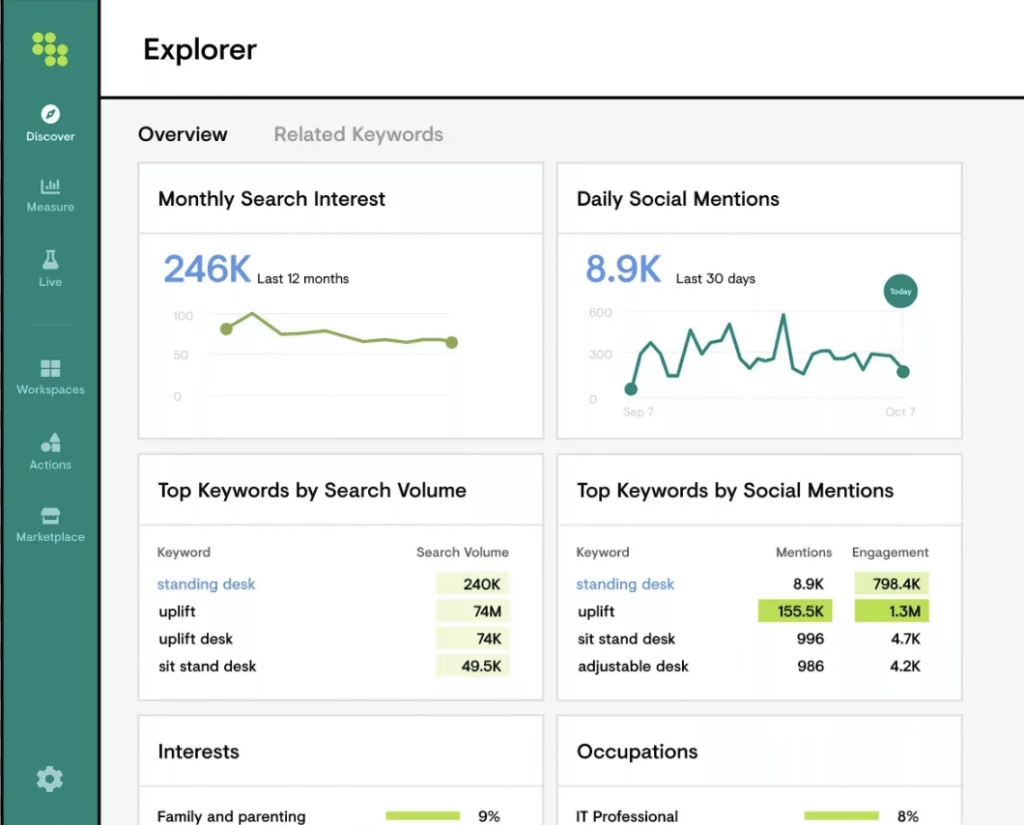
Conductor is the best MarketMuse alternative for organizations that require collaborative SEO workflows, multi-team visibility, and enterprise-level integrations. While MarketMuse specializes in topic modeling and content briefs, Conductor delivers unified data pipelines, customizable permissions, and holistic performance analytics for global brands and agencies. Conductor AI and workflow automation accelerate site health checks, content production, and cross-team strategy execution.
The Conductor pricing is custom and tailored to enterprise and large team requirements. This positions Conductor above MarketMuse in terms of investment, but Conductor includes more comprehensive data unification, workflow, and security features.
The pros highlighted in the Conductor review include unified SEO, content, and competitor research tools, real-time performance data, and seamless integration with existing marketing tools, which benefit enterprise teams managing complex SEO programs.
The cons of Conductor are high pricing, a steep learning curve, feature overload for small teams, occasional speed issues, rigid contracts, limited technical support for integrations, and occasional reporting problems.
7. Scalenut: Best MarketMuse Alternative for AI Content Planning
Scalenut is an AI-driven SEO platform that combines topic discovery, content planning, optimization, and AI visibility tracking to help brands rank in Google, ChatGPT, and other AI search engines.
Scalenut features built-in keyword clustering, prompt optimization, long-form AI content creation, competitor analysis, internal linking, and GEO (generative engine optimization) scoring for tracking visibility and AI citations. Users manage content strategy, monitor AI and Reddit mentions, and secure high-quality backlinks.
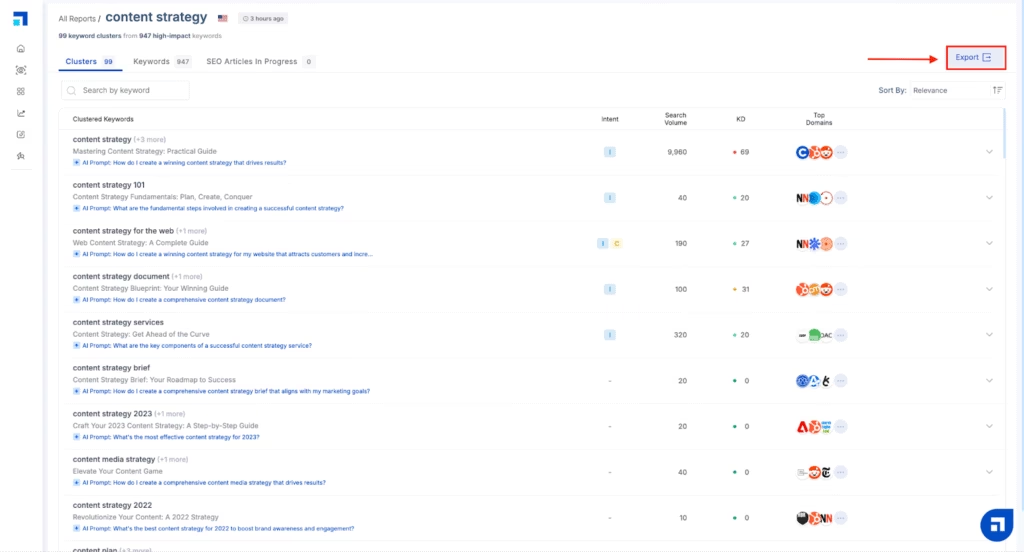
Scalenut is the best MarketMuse alternative for AI-powered content planning and full-funnel optimization. Scalenut automates topic research, organizes keyword clusters, and delivers actionable prompts for content that gets cited by AI. Compared to MarketMuse, Scalenut emphasizes prompt coverage, GEO scoring, and AI citation tracking, and offers broader integration with AI and social platforms.
Scalenut is a cheaper Marketmuse alternative with plans from $29/month, which is $50 lower than the entry plan in MarketMuse.
The pros discussed in the Scalenut review include advanced keyword clustering, a built-in backlink marketplace, and multi-channel monitoring, which support rapid growth and broad visibility. The cons of Scalenut are a complex interface for new users, limited export options, and fewer advanced technical SEO features than some enterprise platforms.
8. Dashword: Best MarketMuse Alternative for Real-Time Content Scoring
Dashword is a content optimization platform that provides real-time content scoring, brief creation, and post-publication monitoring for SEO-focused teams.
Dashword features a content brief builder that compiles competitor outlines and essential topics, a content editor with instant keyword and quality checks, and automated content monitoring that tracks page performance and alerts users when updates are needed. Teams use Dashword to create briefs, optimize drafts before publishing, and monitor rankings.
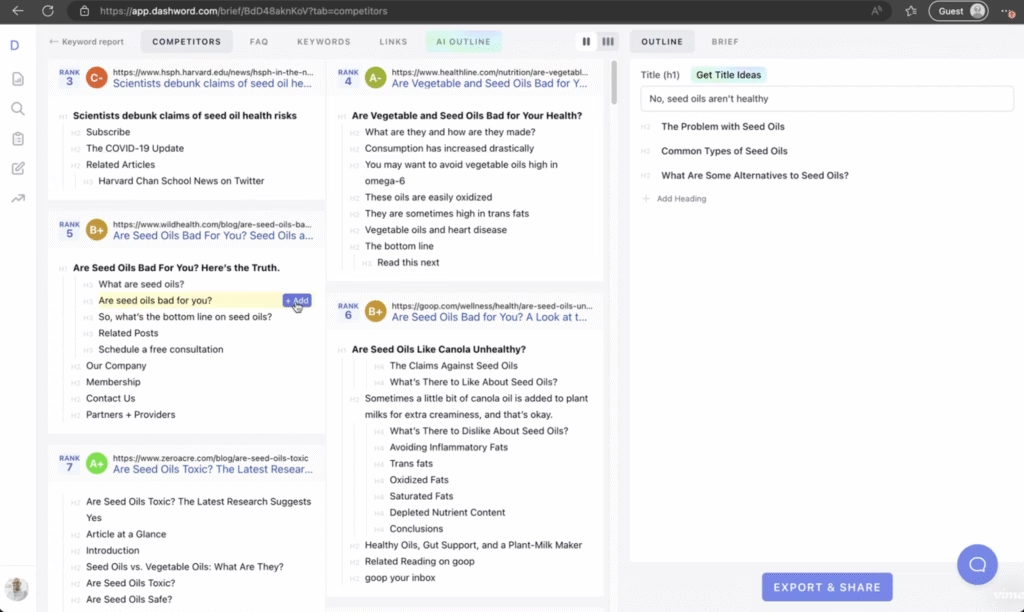
Dashword is the best MarketMuse alternative for teams that need fast content scoring, automated brief creation, and ongoing content monitoring. Dashword delivers instant feedback on keyword coverage and structure, weekly keyword reports, and alerts for underperforming pages.
Dashword pricing starts at $99/month for 30 reports and five users, with a free trial available.
The pros highlighted in the Dashword review include rapid content brief creation, real-time SEO scoring, automated post-publication monitoring, and an easy-to-use interface. The cons of Dashword are that it has fewer advanced research and topic modeling tools compared to the MarketMuse SEO tool, basic project management, and higher-tier pricing for large teams.
9. WriterZen: Best MarketMuse Alternative for Topic Discovery & Keyword Clustering
WriterZen is a keyword research and topic discovery platform that specializes in identifying keyword clusters and supporting content planning for SEO-focused teams.
WriterZen features Topic Discovery, which generates hundreds of keyword clusters from a single seed term, Keyword Explorer, which analyzes search volume and competition, Keyword Planner, which builds a content calendar, and a GPT-powered content editor, which assists with draft creation. Teams use WriterZen to map out new topic opportunities, build keyword-driven outlines, and plan content strategies.
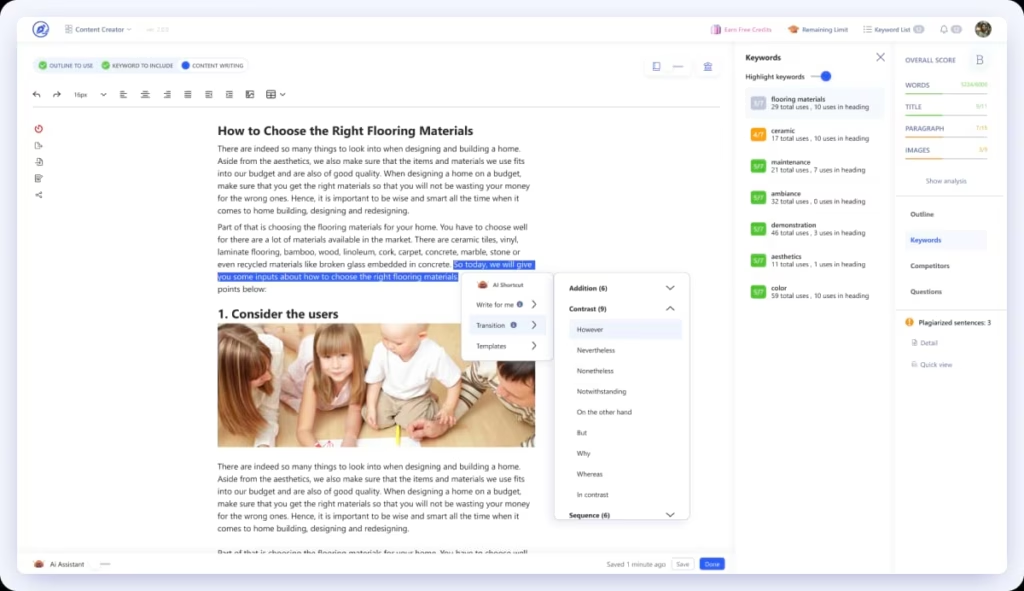
WriterZen is the best MarketMuse alternative for topic research and keyword clustering at scale. MarketMuse emphasizes AI content optimization and detailed briefs, while WriterZen excels at uncovering new topics, clustering keywords for content hubs, and simplifying workflow management.
WriterZen uses a lifetime pricing model with a one-time fee ranging from $150 to $225 for unlimited access to core features such as topic discovery, keyword clustering, and basic content creation, and $75 for the Keyword research package. Higher tiers unlock more keyword credits, more user seats, and greater content usage limits, while optional credit packs are available for larger projects.
Compared to MarketMuse at $99/month, WriterZen lifetime access provides substantial long-term savings for agencies and individuals who need scalable keyword research and planning without ongoing costs.
The pros highlighted in the WriterZen review include strong topic discovery, intuitive keyword clustering, affordable entry price, and straightforward onboarding, which accelerate keyword research and content planning.
The cons of WriterZen are fewer advanced optimization and grading features, limited third-party integrations, and basic AI content tools compared to more comprehensive competitors.
10. Clearscope: Best MarketMuse Alternative for Easy-to-Use Content Scoring
Clearscope is a cloud-based content optimization tool that guides writers and SEO teams to produce search-relevant, well-structured content based on real SERP data.
Clearscope analyzes top-ranking pages for any query, surfaces recommended keywords and questions, and assigns a content score to show how closely a draft matches current search intent. Clearscope core features include Content Reports for keyword and competitor analysis, Keyword Discovery for opportunity research, and a Content Editor that grades drafts in real time. Clearscope integrates directly with Google Docs and WordPress, which supports teams working inside existing content workflows.
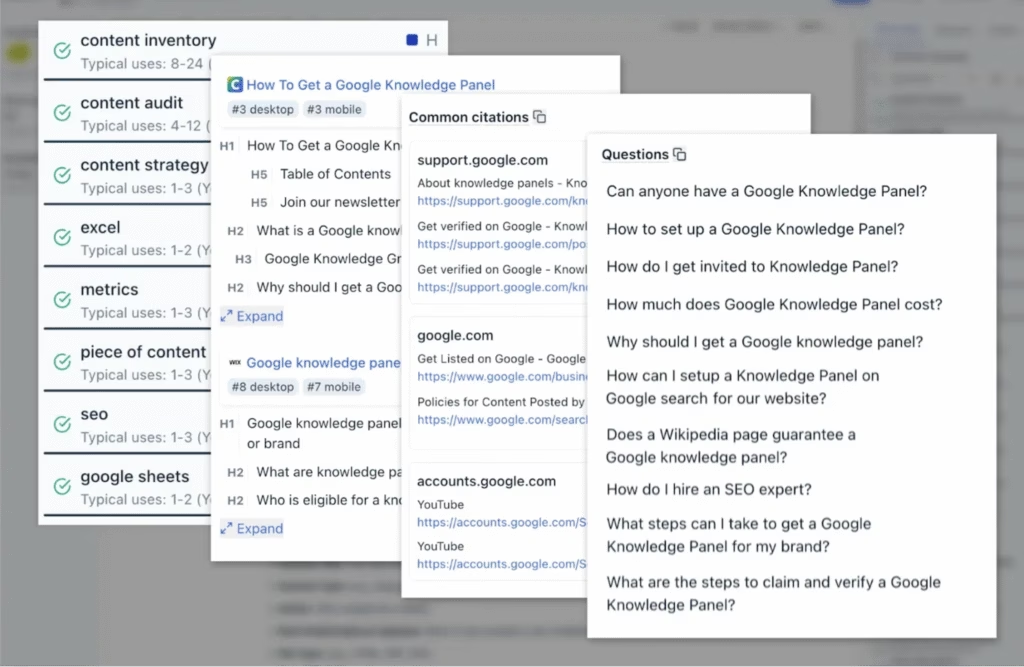
Comparing MarketMuse vs Clearscope, Clearscope is a MarketMuse alternative for teams who want fast, reliable content scoring and intuitive optimization guidance. MarketMuse focuses on deep content planning and topic modeling, while Clearscope emphasizes ease of use, actionable scoring, and efficient keyword coverage analysis. Clearscope pricing starts at $189/month, which is almost double the MarketMuse $99/month starting price.
The pros highlighted in the Clearscope review include a user-friendly interface, fast onboarding for teams, actionable content scores, and reliable integrations, which streamline editorial workflows and improve ranking accuracy.
The cons of Clearscope are high pricing for entry plans, no backlink or technical SEO tools, report credit limitations, and basic collaboration features compared to all-in-one platforms.
11. BrightEdge: Best MarketMuse Alternative for Enterprise Insights
BrightEdge is an enterprise SEO platform built for large organizations that require unified search intelligence, automation, and performance measurement for complex digital portfolios.
BrightEdge combines keyword research, content optimization, technical auditing, real-time trend monitoring, and custom reporting in a single platform designed for multi-domain teams. The 6 main features in BrightEdge are Data Cube X (competitive intelligence), Copilot (AI recommendations), Autopilot (fully automated optimization), ContentIQ (site audits), Instant (live SERP trends), and StoryBuilder (custom reporting). BrightEdge integrates with analytics tools and supports full-funnel measurement, which enables marketing leaders to align SEO strategies with business outcomes.
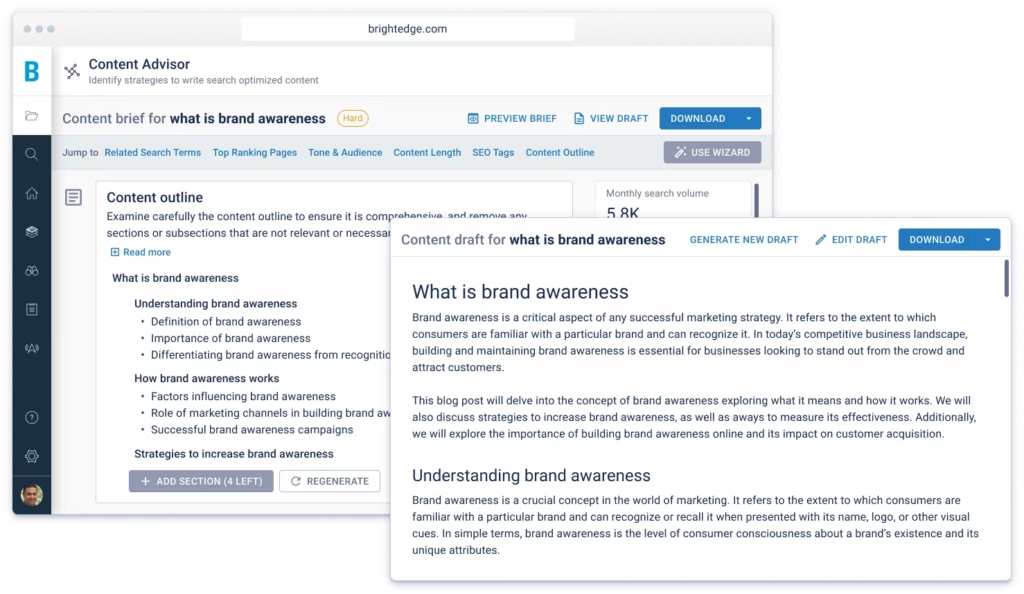
BrightEdge is the best MarketMuse alternative for enterprise teams that require advanced AI-driven insights, automated execution, and global scale. MarketMuse targets deep content planning and topic modeling, while BrightEdge focuses on integrating competitive intelligence, workflow automation, and reporting across large digital environments.
BrightEdge pricing is custom-quoted and usually begins at several thousand dollars per month with annual contracts, which makes it one of the most expensive BrightEdge competitors.
The pros from the BrightEdge review include enterprise-scale automation, real-time keyword and trend data, deep technical auditing, and dedicated strategic support. The cons of BrightEdge are high pricing, no free trial, a steep learning curve, and limited value for smaller teams or agencies.
BrightEdge delivers enterprise power for organizations with complex needs, but its cost and feature set make it a poor fit for smaller businesses or self-serve SEO teams.
12. Outranking: Best MarketMuse Alternative for AI Content Structuring
Outranking is an AI-powered SEO platform focused on content briefs, SERP-driven structuring, and workflow automation.
Outranking enables users to generate SEO outlines, create fact-checked first drafts, and optimize on-page elements using Google NLP and GPT-4. Outranking prioritizes E-E-A-T (Experience, Expertise, Authoritativeness, and Trustworthiness) alignment, originality scoring, and keyword clustering to support predictable ranking success.
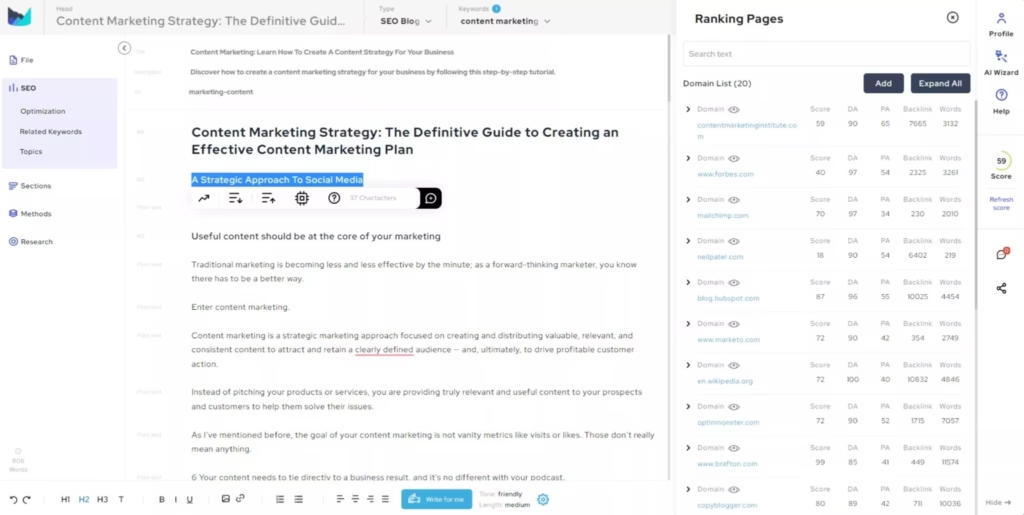
Outranking is the best MarketMuse alternative for teams that need AI-driven content briefs, granular keyword strategy, and automated optimization. MarketMuse centers on topic modeling and deep content research, while Outranking focuses on step-by-step content creation, originality, and real-time SERP analytics.
The main advantages mentioned in the Outranking review include SERP-aligned content briefs, originality features, fast outline and draft generation, and keyword clustering at scale. The main drawbacks of Outranking are high character consumption for advanced features, a busy UI for new users, and limited backlink or technical SEO tools.
13. INK for All: Best MarketMuse Alternative for Distraction-Free SEO Writing
INK for All is an AI-powered content writing and optimization suite built for distraction-free workflows and fast SEO execution.
INK for All combines keyword research, content scoring, plagiarism checking, and image generation in a single interface. Users generate unlimited articles, run AI content audits, and access features like Content Shield for AI and plagiarism protection.
INK for All supports semantic SEO scoring, intent-based optimization, and real-time competitor analysis, which helps teams boost rankings and maintain brand safety. INK for All is accessible via a web app and offers integrations with WordPress and Unsplash for direct publishing and visuals.
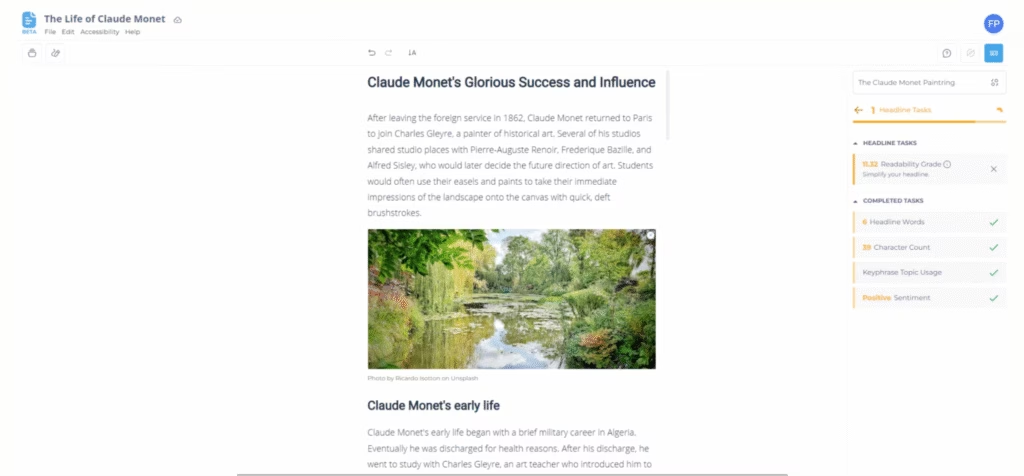
INK for All is the best MarketMuse alternative for writers and small teams that want a minimal, unified environment for producing and optimizing SEO content. MarketMuse prioritizes topic modeling and advanced brief building, while INK for All focuses on frictionless, high-velocity writing, integrated protection, and simple team management.
The main benefits mentioned in the INK for All review include unlimited AI writing, easy keyword clustering, distraction-free editing modes, and unique content shield features. The main drawbacks are occasional limits with advanced analytics, credit-based usage for some features, and a less robust research workflow than MarketMuse.
14. Plerdy: Best MarketMuse Alternative for Website User Behavior Insights
Plerdy is a website analytics and conversion rate optimization platform that tracks user behavior, analyzes conversion paths, and automates CRO (Conversion Rate Optimization) improvements with AI-powered heatmaps, session replays, popups, and SEO audits.
Core features of Plerdy include dynamic heatmaps, video session recordings, pop-up and NPS survey builders, A/B testing, ecommerce tracking, AI UX assistant, and full-site SEO audits. Plerdy integrates with tools like Google Analytics, HubSpot, and MailChimp.

Compared to MarketMuse, Plerdy is the best alternative for teams who prioritize real-time user insights, conversion rate optimization, and visual analytics instead of content scoring and topic modeling. MarketMuse focuses on content briefs and optimization scoring, while Plerdy provides website behavior analysis, CRO tools, and UX data for e-commerce and service brands.
Plerdy offers a free plan with basic features. Paid plans start at $32/month for the Startup tier, with Scale at $64/month and Thrive at $108/month. Higher-usage enterprise options start at $97/month. Most users save over $60/month by choosing Plerdy over MarketMuse, which starts at $99/month.
The main advantages listed in the Plerdy review are instant setup, CRO reporting, highly accurate analytics, and cost efficiency for small and midsize teams. Disadvantages of Plerdy are a learning curve for new users, limited advanced content optimization, and some feature restrictions on lower plans.
15. NeuronWriter: Best MarketMuse Alternative for Budget-Friendly Content Optimization
NeuronWriter is a semantic content optimization platform that uses NLP (natural language processing), Google SERP analysis, and competitor data to help users create, plan, and optimize content for search engines and AI discovery.
Teams use NeuronWriter to generate outlines, draft articles, and surface the best phrases and topics for user intent, with workflow tools for content planning, management, and internal linking. Plagiarism checks, AI-powered draft writing, and real-time performance scoring are available in all paid plans.
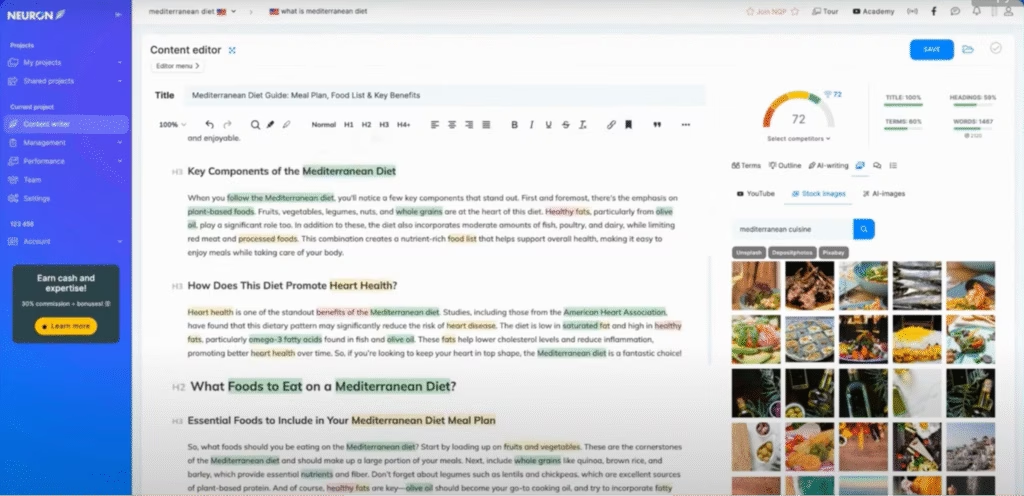
NeuronWriter is the best alternative to MarketMuse for individuals and teams that need affordable, data-driven content optimization. MarketMuse targets enterprise-level planning and topic modeling, while NeuronWriter excels at providing actionable optimization tips, SERP-driven outlines, and fast keyword analysis at a fraction of the price. NeuronWriter includes Google Search Console, WordPress, and Shopify integrations, making it a fit for agencies and in-house marketers.
Paid plans start at $23/month (Bronze), with Silver at $45, Gold at $69, Platinum at $93, and Diamond at $117. Even the highest Diamond tier costs less than the entry plan in MarketMuse, which saves teams over $70 per month compared to MarketMuse Optimize ($99/month). A free trial is available with limited credits for new users.
Pros mentioned in the NeuronWriter review include low starting price, robust NLP optimization, simple onboarding, and generous analysis limits for the cost. NeuronWriter enables fast competitor analysis, efficient workflow management, and useful integrations. The cons of NeuronWriter are fewer technical SEO features, basic AI templates in lower plans, and a UI (user interface) that feels busy for beginners.
16. SEOwind: Best MarketMuse Alternative for AI-powered SEO Content Briefs
SEOwind is an AI-powered platform for generating SEO content briefs, updating articles, and producing EEAT-optimized content at scale.
The SEOwind platform combines a SERP-based brief generator, an AI article writer, a content update engine, keyword clustering, competitor analysis, and internal linking. Both self-serve and managed service models are available for solo marketers, agencies, and in-house teams.
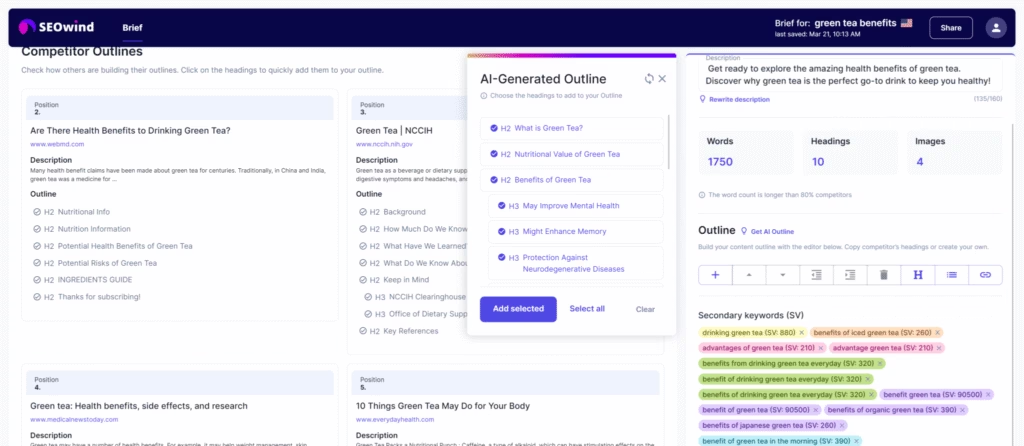
SEOwind is an alternative to MarketMuse for users who need workflow automation, smart content briefs, and a system that supports both Google and LLM-driven search. Compared to MarketMuse, SEOwind offers faster content brief generation, automated article updates, and integration of expert-led support with each plan. While MarketMuse focuses on topic modeling and scoring, SEOwind prioritizes speed, modularity, and continuous optimization.
SEOwind plans start at $59/month for 8 articles, with Pro at $89/month for 20 articles, and Agency at $359/month for 100 articles. A 3-day free trial covers 2 articles. Pricing is $40 less per month than the MarketMuse Optimize plan. Managed growth partnerships begin at $2,500 per month for enterprise clients.
The main advantages included in the SEOwind review are fast content outline creation, AI-powered article updates, EEAT scoring, internal linking suggestions, and high user satisfaction with onboarding. The main drawbacks of SEOwind are article caps on entry plans, limited domain support for smaller plans, and fewer technical SEO features than some full-suite tools.
17. AirOps: Best MarketMuse Alternative for Scaling AI Content Operations
AirOps is a no-code AI workflow platform for scaling content operations with competitive search insights and automated content lifecycle management.
AirOps supports content gap detection, AI search visibility tracking, on-demand content refresh, and template-based content creation for brands that want to boost AI and SEO performance without extra headcount.
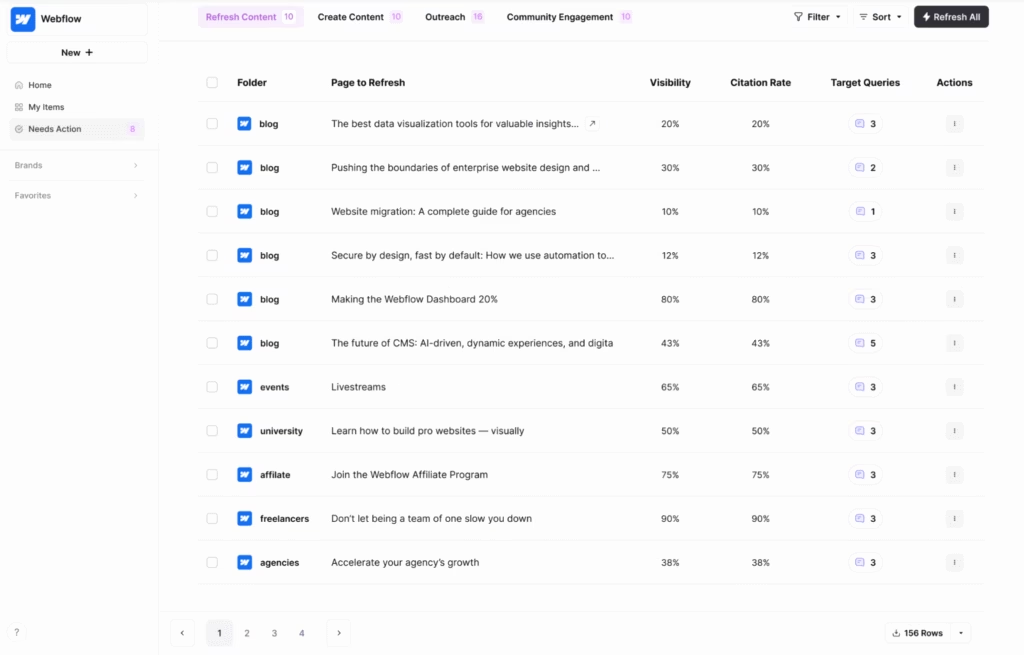
AirOps is the best alternative to MarketMuse for users who prioritize high-volume content operations, automated opportunity identification, and rapid content updates. While MarketMuse centers on topic modeling and optimization scoring, AirOps covers the full content lifecycle with insight-to-action automation, team training, and deep CMS (Content Management System) integrations.
AirOps features an AI content dashboard, workflow automation, search visibility insights, and multi-brand management. Brands use AirOps to fill content gaps, refresh and publish at scale, and improve visibility in Google, ChatGPT, and agent-driven search engines.
AirOps plans start with a free Solo tier for one user and basic templates. The Scale plan is custom-priced, includes unlimited users and advanced features, and requires a sales conversation. Enterprise packages add 1:1 onboarding, private training, advanced reporting, and embedded content engineers.
The pros highlighted in the AirOps review are scalable content automation, direct CMS integration, custom insights, and expert support for building in-house AI content systems.
Cons of AirOps include limited self-service documentation for advanced features, lack of deep topic modeling, and custom pricing that may not suit solo freelancers.
18. Article Insights: Best MarketMuse Alternative for AI-driven Content Analysis
Article Insights is an AI-powered content optimization tool that helps users write keyword-rich, SEO-optimized articles quickly by combining automated keyword grouping, competitor analysis, and integrated AI writing with ChatGPT models.
Core Article Insights features include data-mined keyword groups based on competitor content, a built-in AI writer supporting multiple GPT models, and a visual competitor keyword analysis dashboard that speeds up research and improves topical relevance.
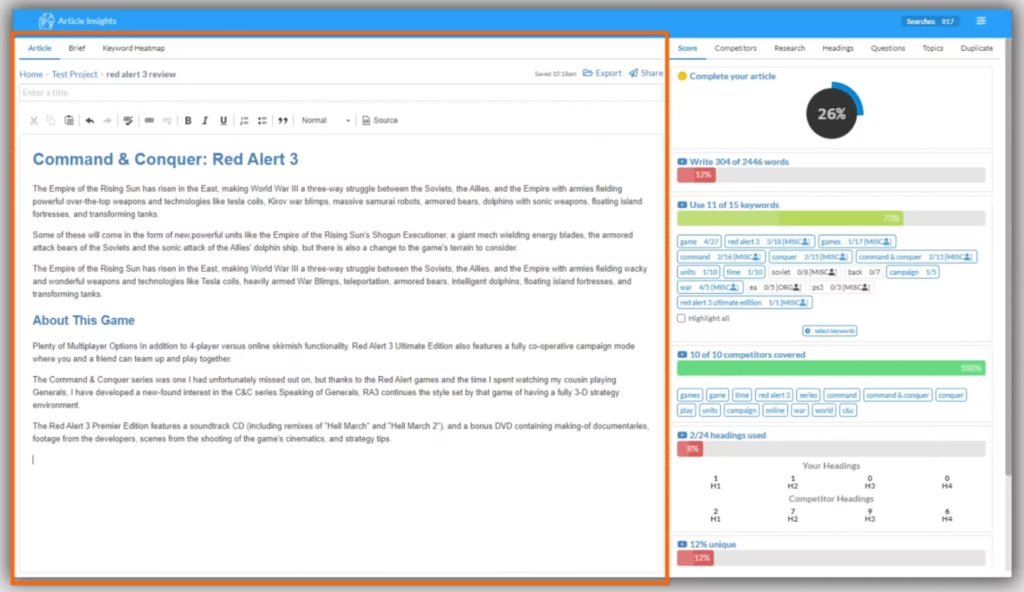
Article Insights is an alternative to MarketMuse for fast, AI-driven content analysis and keyword optimization. Article Insights is for freelancers and small teams who want to reduce research time and automate SEO content creation. Compared to MarketMuse, Article Insights focuses on rapid article production and keyword suggestions rather than deep content scoring, topic modeling, or content briefs.
Pricing for Article Insights starts at $4.99 per month (Starter), with Pro ($9.99/month) and Agency ($19.99/month) plans. The pricing makes Article Insights one of the cheapest MarketMuse alternatives, over $90 less per month than the MarketMuse Optimize plan.
The main pros brought up in the Article Insigths review include ultra-low cost, simple onboarding, fast AI writing, and time-saving keyword research. Main cons are limited advanced optimization features, fewer integrations, and a lightweight approach compared to tools like MarketMuse.
19. Rytr: Best MarketMuse Alternative for Short-form AI Writing
Rytr is an AI writing assistant built for fast, affordable short-form content creation for over 40 use cases, including emails, blog outlines, captions, landing page copy, and social media posts.
Key Rytr features include AI-driven templates, tone matching, grammar and plagiarism checks, a Chrome extension, and support for 35+ languages.
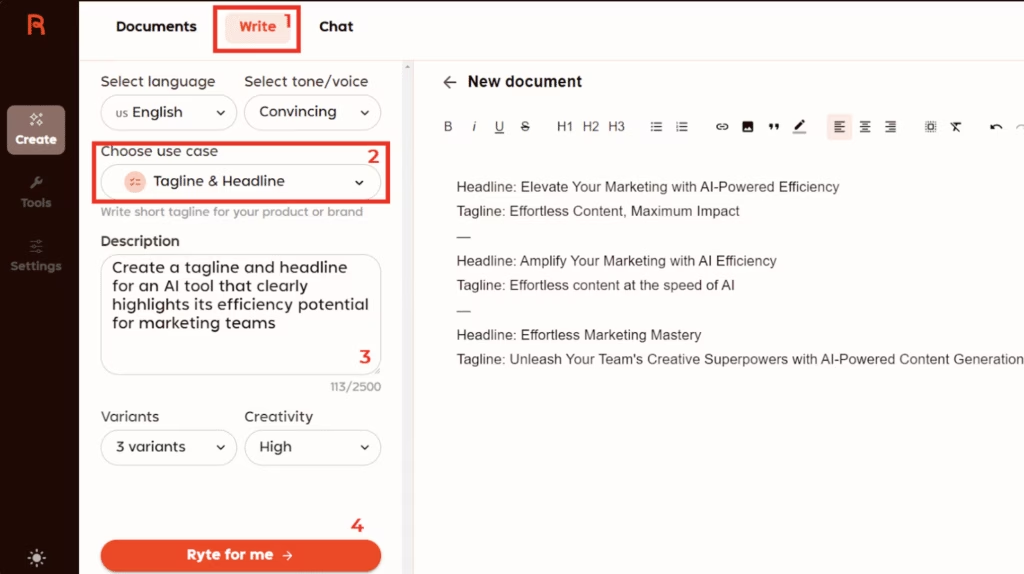
Rytr serves as a MarketMuse alternative for individuals and small teams who need quick, low-cost AI-generated short-form content and basic SEO copywriting. Compared to MarketMuse, Rytr focuses on rapid content ideation and multi-channel text generation rather than deep content analysis, topic modeling, or SERP-driven optimization.
Rytr pricing starts at $0 for the Free plan (10K characters monthly), $9/month for unlimited content, and $29/month for Premium with multiple tone profiles and higher usage limits. Rytr is $90 cheaper than MarketMuse starting monthly plans.
The main advantages mentioned in the Rytr review are low pricing, a simple interface, wide template selection, multi-language support, and fast content output. Main drawbacks of Rytr are basic optimization tools, no advanced content grading, and limited research or competitive analysis compared to MarketMuse.
20. WriterAccess: Best MarketMuse Alternative for Finding Freelance SEO Writers
WriterAccess is a content marketplace that connects businesses with freelance SEO writers, editors, strategists, and translators, and offers a blend of human creativity and AI-boosted workflow tools.
WriterAccess features include writer vetting, project management, AI topic and brief wizards, Copyscape integration, and managed content services with dedicated support.
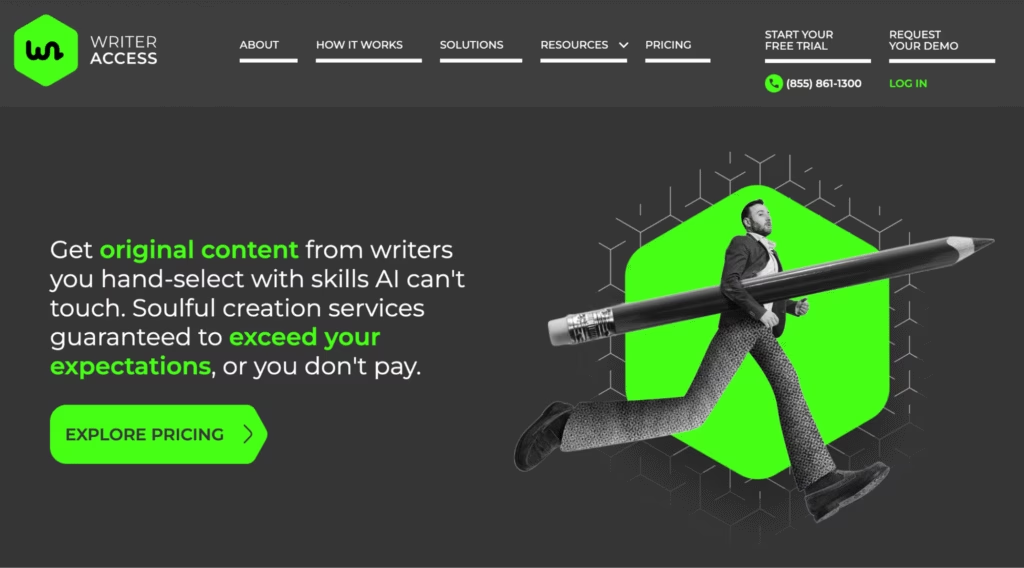
WriterAccess works as a MarketMuse alternative for organizations that need to find and manage freelance SEO writers at scale, instead of relying on automated content planning and optimization. While MarketMuse automates content research and optimization using AI, WriterAccess focuses on human-led content creation, custom briefs, and direct access to expert writers in any niche.
WriterAccess plans start at $49/month for the Basic plan, $79/month for Pro, and $449/month for Managed service, starting at $50 cheaper than MarketMuse. Content is priced separately from $0.04 to $1.00+ per word, which makes WriterAccess flexible but potentially more expensive for ongoing, high-volume SEO needs.
Pros included in the WriterAccess review are access to a large pool of vetted writers, advanced workflow tools, managed content options, and flexible project-based pricing. WriterAccess cons are platform fees, extra costs for high-level talent, and less automation for research and optimization compared to MarketMuse.
21. Semrush SEO Writing Assistant: Best MarketMuse Alternative for Platform Integration
Semrush SEO Writing Assistant is a tool that provides real-time SEO recommendations, readability analysis, tone of voice checks, and plagiarism detection inside Google Docs, WordPress, and Microsoft Word 365.
The Semrush SEO Writing Assistant tool analyzes live SERP data and offers direct suggestions for keyword optimization, content structure, and engagement improvement inside the writing environment.
Semrush SEO Writing Assistant is an alternative to MarketMuse for content teams that want instant SEO feedback while writing or editing in familiar platforms. MarketMuse focuses on standalone topic modeling and content scoring. Semrush SEO Writing Assistant delivers immediate, actionable tips and seamless integration with daily content workflows.
Pricing for Semrush SEO Writing Assistant starts at $60/month for the Content Plan. Full Semrush platform plans begin at $129.95/month. This tool is a more flexible and accessible solution for teams that already use Semrush and often comes at a lower price than MarketMuse for content-focused workflows.
Semrush SEO Writing Assistant offers pros such as easy workflow integration, real-time feedback, reliable plagiarism checks, and support for multiple languages, according to our Semrush review. Cons of Semrush include limited topic modeling depth compared to MarketMuse, usage caps on entry plans, and the requirement to have a Semrush subscription for full feature access.
22. Ahrefs: Best MarketMuse Alternative for Content Gap Analysis
Ahrefs is a full-scale SEO platform that helps marketers analyze competitors, identify content gaps, audit websites, track rankings, and monitor backlinks with one of the largest live SEO databases.
The Ahrefs platform includes tools such as Site Explorer, Keywords Explorer, Content Gap, Rank Tracker, Site Audit, and AI Content Helper. It supports advanced research and execution for content-driven teams.
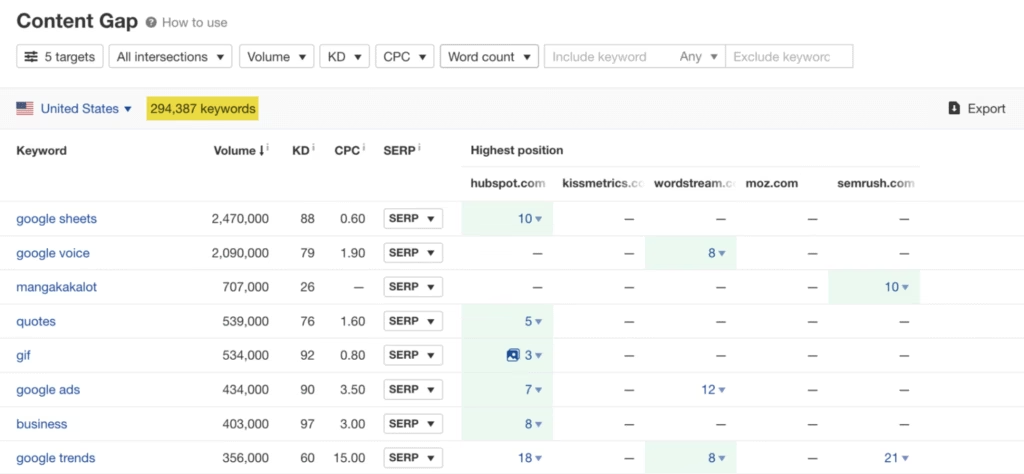
Ahrefs is a top alternative to MarketMuse for users who need comprehensive content gap analysis, competitive research, and backlink intelligence. MarketMuse focuses on content scoring and topic modeling, while Ahrefs delivers granular gap analysis, keyword opportunity discovery, and link monitoring for enterprise and agency workflows.
Pricing for Ahrefs starts at $129/month for the Lite plan. The Standard plan is $249/month, and the Advanced plan costs $449/month. Entry pricing for Ahrefs is higher than for MarketMuse, but Ahrefs provides broader coverage for SEO research and site audits.
Our Ahrefs review shows advantages such as industry-leading content gap analysis, deep backlink and keyword databases, and API access for scaling research. Disadvantages of Ahrefs include high pricing, project and user limits in lower-tier plans, and credit-based usage restrictions for advanced features.
23. Moz Pro: Best MarketMuse Alternative for Competitor Content Strategy
Moz Pro is an all-in-one SEO platform for keyword research, site audits, backlink analysis, rank tracking, and competitor research. Moz Pro supports content planning and on-page optimization for websites and agencies.
Moz Pro features include Keyword Explorer, Link Explorer, Domain Overview, Rank Checker, Site Crawl, On-Page Optimization, Keyword Gap Tool, and MozBar. Moz Pro uses Domain Authority and Page Authority as core metrics for site and page strength.
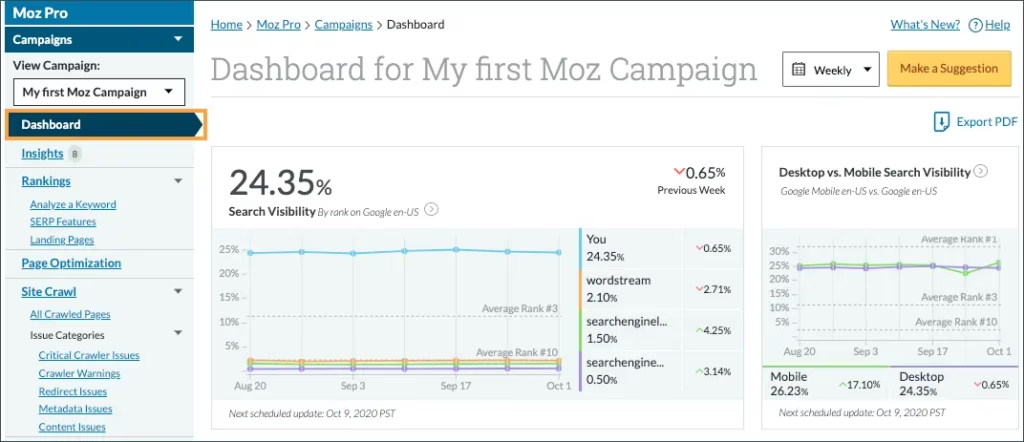
Moz Pro is an alternative to MarketMuse for competitor tracking, backlink intelligence, and foundational rank tracking. Compared to MarketMuse, Moz Pro is a better choice for teams that need a simple dashboard for keyword research, domain analysis, and basic audits. MarketMuse is stronger for topic modeling and optimization scoring, while Moz Pro excels at competitor tracking and beginner SEO workflows.
Moz Pro is a paid SEO tool. Plans start at $49/month for Starter, $99 for Standard, $179 for Medium, and $299 for Large. Moz Pro is $50 cheaper than the MarketMuse Optimize plan, but lacks advanced content optimization and AI writing.
According to Moz review, Moz Pro gets positive feedback for its simple interface, beginner-friendly features, and trusted educational resources. Moz Pro fails to match competitors on keyword coverage, backlink freshness, traffic estimates, and real-time data. Moz Pro does not provide advanced technical SEO, outbound link audits, or deep competitive insights.
24. Raven Tools: Best MarketMuse Alternative for Integrating SEO Content Reporting
Raven Tools is a cloud-based SEO and reporting platform for digital marketers and agencies. Raven Tools provides unified tools for analyzing SEO performance, managing keyword and backlink data, conducting technical site audits, and compiling automated multi-channel reports.
Key features of the Raven Tools platform are rank tracking, website auditing, keyword research, backlink checker, Link Spy for competitor links, marketing reporting, and competitor domain research.
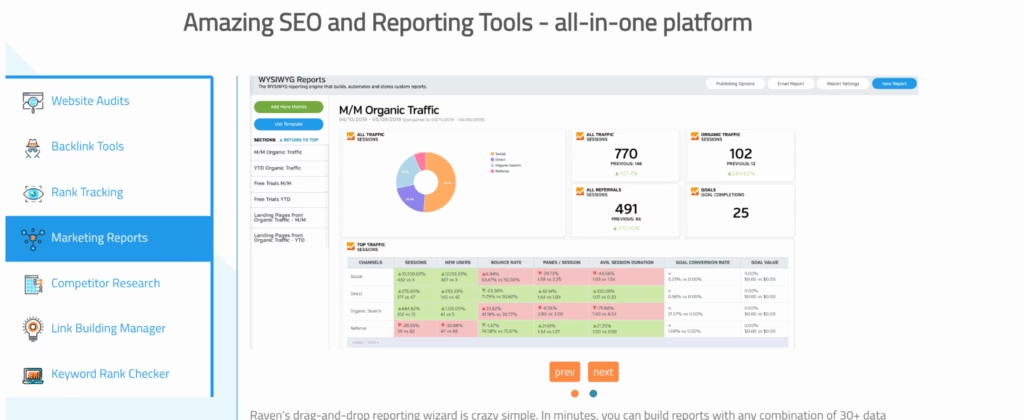
Raven Tools is a MarketMuse alternative for teams focused on SEO reporting, rank tracking, competitor research, and cross-platform data aggregation. Compared to MarketMuse, Raven Tools is the best alternative for automated reporting, multi-client dashboard management, and integrating SEO metrics from various sources. MarketMuse specializes in content optimization and topic modeling, while Raven Tools serves agencies that need scalable reporting and multi-channel campaign oversight.
Raven Tools is a paid tool with plans starting at $49/month, which is about $50 less than MarketMuse Optimize. Higher tiers increase domain, user, and report limits up to $479/month for the Lead plan.
Pros in the Raven Tools review emphasize high-volume reporting, white-label customization, and broad data integration for client campaigns. The cons of Raven Tools are limited keyword data depth, a legacy interface, and basic content optimization features.
Raven Tools is cost-effective for reporting but requires other platforms for advanced SEO or content intelligence.
Why Do People Seek Alternatives to MarketMuse Tool?
People seek alternatives to MarketMuse because the tool is expensive, complex, and limited in features. MarketMuse targets teams that need advanced content intelligence, but MarketMuse pricing starts at $99/month and ranges to $1,499/month for full features, which excludes most freelancers and small businesses.
High cost, slow onboarding, and missing features are the 3 main reasons users look for other tools like MarketMuse. Most negative reviews reference the price gap between MarketMuse and its competitors.
MarketMuse lacks essential tools such as integrated keyword research, backlink data, technical SEO audits, and flexible content workflows, which are now standard in leading alternatives.
Users often cite a difficult learning curve in MarketMuse, which makes it challenging to get quick value from the platform. Several reviews mention slow support response and confusion over how to use the topic inventory system.
What to Look for in a MarketMuse Alternative?
The best MarketMuse alternative includes advanced content optimization, integrated research, and flexible workflow automation. MarketMuse SEO software targets content intelligence, but most teams want a single platform that covers keyword research, SERP analysis, content briefs, optimization scoring, and reporting. Look for a tool that combines AI-powered recommendations, user-friendly dashboards, and seamless integrations with Google Docs, WordPress, or CMS systems.
Choose a MarketMuse alternative that supports real-time SERP data, topic clustering, and actionable content scoring to improve efficiency and ranking accuracy. Prioritize tools that deliver transparent pricing, intuitive onboarding, and customer support with proven expertise in content SEO. Strong reporting, collaboration features, and the ability to automate technical SEO audits make a tool more valuable for agencies and in-house teams. Select a platform that fits your budget and provides scalability for projects of any size.
What is the Difference Between MarketMuse vs Clearscope?
The difference between MarketMuse vs Clearscope is the approach to content optimization, content scoring, and user workflow.
MarketMuse focuses on topic modeling, competitive gap analysis, and automated content briefs, which support long-form research and content planning. Clearscope emphasizes real-time keyword recommendations, SERP-driven scoring, and a user-friendly content editor, which helps writers optimize drafts for ranking quickly.
MarketMuse is best for deep research and content strategy, while Clearscope is preferred for fast optimization and workflow simplicity. The most important contrast in MarketMuse vs Clearscope lies in the balance between advanced topic modeling and actionable, real-time guidance.
What is the Difference Between MarketMuse vs Surfer SEO?
The difference between MarketMuse vs Surfer SEO is the focus on topic modeling, on-page optimization, and real-time SERP data.
MarketMuse relies on AI-driven briefs, topic depth analysis, and content scoring for building authority. Surfer SEO delivers SERP Analyzer, keyword correlation, and instant optimization for headings, structure, and NLP entities.
MarketMuse fits enterprise planning and research, while Surfer SEO supports direct optimization and competitor benchmarking. The best way to understand MarketMuse vs Surfer SEO is by comparing content planning depth to real-time SERP-driven workflows.
What is the Difference Between MarketMuse vs Frase?
The difference between MarketMuse vs Frase is the integration of research automation, AI writing, and workflow flexibility.
MarketMuse delivers structured briefs, competitive topic coverage, and advanced scoring for in-depth content planning. Frase combines instant SERP analysis, AI-generated outlines, and flexible document production, which speeds up the creation of SEO-optimized drafts.
MarketMuse is ideal for research-heavy teams, while Frase serves users who need fast, AI-powered content. The distinction in MarketMuse vs Frase appears in the workflow, from research-centric briefs to instant AI-driven content production.
Why is Search Atlas the Best Market Muse Alternative?
Search Atlas is the best MarketMuse alternative because it delivers the most complete set of SEO automation, content optimization, and technical features in a single, transparent subscription for 2025.
Search Atlas includes keyword research, technical site audits, AI-driven content briefs, backlink analysis, topical clustering, local SEO dashboards, and automated reporting in every plan. MarketMuse divides topic modeling, scoring, and brief creation across tiers, with limits and add-ons that raise costs quickly.
Search Atlas replaces MarketMuse by unifying content planning, real-time SERP analysis, audit automation, and link management into one platform. Users create outlines, optimize drafts, run technical audits, schedule Google Business Profile (GBP) updates, and track ranking improvements without switching tools. MarketMuse focuses on content intelligence but requires separate tools or integrations for audit, rank tracking, or local optimization.
Search Atlas uses live keyword and entity data from Google Search Console (GSC) and automates site fixes with OTTO SEO. MarketMuse surfaces opportunities and issues, but does not execute changes. Search Atlas users apply schema markup, address Core Web Vitals, and improve internal linking.
MarketMuse pricing starts at $99/month for basic features and scales sharply with usage. Search Atlas starts at $99/month for the full feature set, including AI-powered optimization and automated reporting for multiple sites. Most teams save $100 to $500 per month by switching to Search Atlas and eliminating overlapping tools.
Start a free 7-day trial with Search Atlas to compare coverage and workflow efficiency with MarketMuse.





